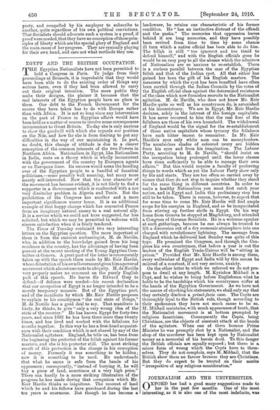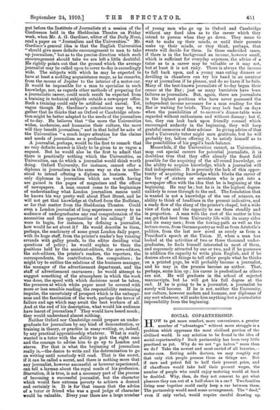JOURNALISM AND UNIVERSITIES.
XFORD has had a good many suggestions made to ‘.5 her in the past few months. One of the most interesting, as it is also one of the most indefinite, was put before the institute of Journalists at a session of the Conference held in the Sheldonian Theatre on Friday week, when Mr. A. G. Gardiner, editor of the Daily News, read a paper on " Journalism and the Universities." Mr. Gardiner's general idea is that the English Universities "should give more definite encouragement to men to take up journalism," but as to the precise direction which such encouragement should take we are left a little doubtful. He rightly points out that the ground which the average journalist may be called upon to cover to-day is exceedingly wide. The subjects with which he may be expected to have at least a nodding acquaintance range, as he remarks, from the moons of Jupiter to the interior of a motor-car. It would be impossible for a man to specialise in such knowledge, nor, as regards other methods of preparing for a Journalistic career, could much result be expected from a training in technical subjects outside a newspaper office. Such a training could only be artificial and unreal. Yet, vague though Mr. Gardiner's conclusions may be, we gather that he thinks that an Oxford or Cambridge educa- tion might be better adapted to the needs of the journalism of to-day. He believes that " the more the Universities widen, modernise, and humanise their culture, the more will they benefit journalism," and in that belief he asks of the Universities " a much larger attention for the claims and needs of journalism as a profession." A journalist, perhaps, would be the first to remark that no very definite answer is likely to be given to so vague a request. But he would also be the first to admit that there is practically nothing which the Universities, as Universities, can do which a journalist would think worth doing. Oxford University, for instance, cannot offer a diploma in journalism in the same way as she is under- stood to intend offering a diploma in business. The only diplomas in journalism which are worth having are gained in the pages of magazines and the offices of newspapers. A man cannot come to the beginnings of understanding what London journalism means until he knows his way pretty well about Fleet Street, and he will not get that knowledge at Oxford from the Bodleian, or for that matter from the Sheldonian Theatre. Could even a London journalist of long experience convey to an audience of undergraduates any real comprehension of the necessities and the opportunities of his calling 2 If he were to begin, for instance, by defining a journalist, how would he set about it ? He would. describe to them, perhaps, the machinery of some great London daily paper, with its huge staff, from the printer's reader's boy running errands with galley proofs, to the editor deciding vital questions of policy ; he would explain to them the positions held by the assistant-editors, the news-editors, the sub-editors, the printer's readers, the reporters, the correspondents, the contributors, the compositors ; he might try to outline the relations of the business manager, the manager of the advertisement department, and the staff of advertisement canvassers ; he would attempt to suggest • something of the atmosphere in which the work was done, the speed with which decisions must be taken, the pressure at which white paper must be covered with more or less sensible reading, the responsibility restraining impulse, the uncertainty of prospect which is the unhappi- ness and the fascination of the work, perhaps the terror of failure and age which may await the best workers of all. And at the end of his description, what would his audience have learnt of journalism ? They would have heard much ; they would understand almost nothing. Neither Oxford nor Cambridge could prepare an under- graduate for journalism by any kind of demonstration, or training in theory, or practice in essay-writing, or, indeed, by any practical apprenticeship whatever. What is really wanted is a tutor with the ability to pick the right man and the courage to advise him to go up to London and starve. For that is what the beginning of journalism really is,—the desire to write and the determination to go on writing until somebody will read. That is the secret, if it can be called a secret, and there is nothing more that any journalist, however successful or however experienced, can tell a layman about the royal roads of his profession. Starvation, it is true, is not a necessary part of the process of becoming a successful journalist, but the character which would face extreme poverty to achieve a desired end certainly is. It is for that reason that the advice of a tutor or friend who was a good judge of character would be valuable., Every year there are a large number of young men who go up to Oxford and Cambridge without any fixed • idea as to the career which they intend to pursue when they go down. They mean to wait to make up their minds; or until their parents make up their minds, or they think, perhaps, that events will decide for them. In these undecided cases, if there is in the background an income, however small, which is sufficient for everyday expenses, the advice of a tutor as to a career may be valuable or it may not, but at least it is not risky. There is always the income to fall back upon, and a young man eating dinners or devilling in chambers can try his hand in an amateur way at journalism if he pleases, and do no harm if he fails. Many of the best-known journalists of to-day began their career at the Bar ; just as many barristers have been failures as journalists. But, again, there are journalists in the highest positions who have never possessed the independent income necessary for a man reading for the Bar or waiting for briefs. They may look back on days when the possibilities of to-morrow's dinner-table were regarded without enthusiasm and without dismay ; but if, too, they can look back upon friendly counsel which encouraged audacity in the beginning, they will keep grateful memories of their adviser. In giving advice of that kind a University tutor might earn gratitude, but he will probably try, before offering it, to satisfy himself as to the possibilities of his pupil's bank-balance.
Meanwhile, if the Universities cannot, as Universities, map out special careers for potential journalists, it is doubtless true that they offer already the finest field possible for the acquiring of the all-round knowledge, or the ability to acquire knowledge, which a journalist will find indispensable. It is precisely the lack of this oppor- tunity of acquiring knowledge which blocks the career of the boy of sixteen or seventeen who is put into a newspaper office with the idea that he is beginning at the beginning. He may be ; but ho is in the highest degree unlikely to come through to the end. The foundation that is wanted is not a knowledge of the use of scissors, an ability to think of headlines in the present indicative, and a ready flow of the slang of the printer's chapel, but a wide view of facts and the capacity to see them steadily and in proportion. A man with the root of the matter in him can get that best from University life with its many sides and its many men; from the towing-path as well as the lecture-room, from Germanpoetryas well as from Aristotle's politics, from the last new novel as surely as from a President's speech at the Union. If, when a man has looked at the activities of two or three thousand under- graduates, he finds himself interested in most of them, and supremely attracted by one or two, and if he possesses in addition the capacity to write plain English, and if he desires above all things to tell other people what he thinks on a printed page, he will probably become a journalist, and he may in the process become an author. That, perhaps, sums him up ; his career is predestined as others are not. He will graduate in the school of rejected manuscripts, but be will get his full degree at the end. If he is going to be a journalist, a journalist he surely will become. If he is not, neither the University, nor culture, however modern and humane, nor diplomas of any sort whatever, will make him anything but a journalistic impossibility from the beginning.











































 Previous page
Previous page